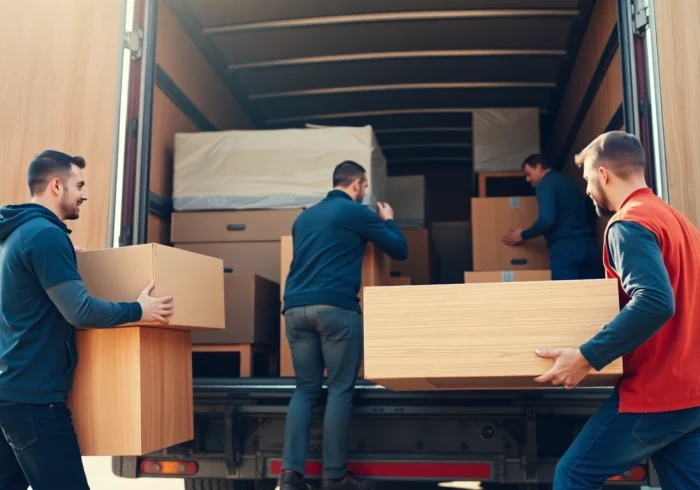Understanding the Basics of House Moves
What are House Moves?
House moves refer to the process of relocating personal belongings from one residence to another. This activity can range from a simple apartment transition to a more complex operation involving a family house, encompassing various logistics that require careful planning and execution. Whether it involves a significant distance or a local relocation, understanding the nuances of house moves is critical to ensuring a successful transition. For professional assistance and more detailed guidance, services that specialize in house moves can be invaluable.
Types of House Moves
Understanding the types of house moves can help you plan more effectively. Here are the primary types:
- Local Moves: Typically involving a move within the same city or state, local moves are generally less complex and may not require significant logistics.
- Long-Distance Moves: Involves relocating across states or over a significant distance, which usually requires more extensive preparation, including scheduling and permits.
- International Moves: These can be the most challenging due to customs regulations and international shipping laws, requiring specialized services and documentation.
- Corporate Relocations: Often involve moving employees’ homes for job-related reasons, generally organized and funded by companies, incorporating additional support.
Key Considerations Before Moving
Before undertaking a house move, several factors should be evaluated:
- Budget: Establish a budget that covers all potential costs, such as moving services, packing supplies, and unexpected expenses.
- Timing: Choose a moving date that allows ample time for preparatory tasks while considering peak moving seasons to avoid higher costs.
- Services Required: Decide whether you will hire professional movers, rent a moving truck, or enlist friends and family for help.
- Packing: Consider what items to take with you and what to leave behind, which will significantly affect packing logistics.
Preparing for Your House Move
Creating a Moving Checklist
One of the best ways to ensure an organized house move is by creating a comprehensive moving checklist. This checklist should include:
- Start date for packing.
- Inventory of all items to be moved.
- List of supplies needed (boxes, tape, etc.).
- Timeline with deadlines for each stage of the process.
- Contact information for moving companies and friends assisting with the move.
Packing Tips for House Moves
Packing effectively is crucial to reduce the stress of a house move. Here are several packing tips:
- Start Early: Begin packing non-essential items weeks in advance, tackling one room at a time.
- Label Boxes: Clearly mark boxes by room and content. This will simplify unpacking once you arrive at your new home.
- Use Quality Packing Supplies: Invest in sturdy boxes, bubble wrap, and packing tape to protect your belongings during transit.
- Declutter: Take the opportunity to dispose of or donate items you no longer need, making the move easier and saving space in your new home.
Choosing the Right Moving Company
When selecting a moving company, it is essential to conduct research and ensure the company meets your specific needs:
- Licensing and Insurance: Confirm that the moving company is properly licensed and insured to avoid potential issues.
- Reputation: Look for customer reviews and testimonials to gauge the reliability of the company.
- Services Offered: Ensure that they provide services such as packing, loading, unloading, and disposal of packing materials.
- Cost Estimates: Request estimates from multiple movers and compare prices, but beware of exceptionally low costs that may indicate poor service.
Executing House Moves with Ease
Coordinating the Moving Day
A well-coordinated moving day can significantly alleviate stress and ensure a smooth transition:
- Confirm the Schedule: Verify the moving company’s arrival time and ensure everyone involved in the move is informed.
- Prepare Your Home: Ensure pathways are cleared for moving trucks and large furniture.
- Have a Plan: Assign roles to all participants, ensuring everyone knows their responsibilities throughout the moving process.
- Take Care of Children and Pets: Arrange for them to be with friends or relatives during the chaos to minimize disruptions.
Essential Tools and Equipment for a Smooth Move
Having the right tools and equipment can make a significant difference in the efficiency of your move:
- Moving Dollies: Useful for transporting heavy boxes and furniture with ease.
- Furniture Pads: Protect your belongings from damage during the move.
- Tool Kit: Have screwdrivers, wrenches, and other tools on hand for disassembling furniture.
- Checklist and Inventory List: Keep track of all items to ensure nothing is left behind or misplaced.
Handling Difficult Items in House Moves
Certain items can present challenges during a move. Here are tips for managing them:
- Pianos and Large Appliances: These often require specialized movers due to their size and weight; it is advisable to arrange professional help.
- Fragile Items: Utilize bubble wrap and padding to protect glassware and delicate items, and label boxes as “fragile” clearly.
- Artwork and Antiques: Use custom-made boxes and padding for valuable items to limit damage during transportation.
- Plants: Ensure that any plants are packed securely to avoid damage; consider climate conditions during transit.
Post-Move Responsibilities
Unpacking and Organizing
Unpacking can often take longer than expected, so it’s beneficial to have a plan in place:
- Start with the Essentials: Begin unpacking essential items that you will need immediately, such as toiletries, clothes, and kitchen supplies.
- Room by Room: Focus on one room at a time to maintain organization and avoid becoming overwhelmed.
- Dispose of Packing Materials: Recycle boxes and dispose of packing materials to keep your new space clutter-free.
Cost Management After House Moves
Managing expenses post-move is critical to maintaining a budget. Consider the following:
- Budget Review: Assess your moving expenses against your initial budget to identify areas of overspending.
- Utility and Service Transfers: Ensure all utilities are transferred, and consider any deposits that may be required.
- New Purchases: Budget for any new necessities that may arise after moving into your new home.
Post-Move Adjustments and Settling In
Settling into a new home involves adjusting to your new environment:
- Neighborhood Exploration: Take some time to explore local shops, parks, and amenities.
- Meet Neighbors: Introduce yourself to neighbors to build a sense of community.
- Establish Routines: Begin establishing routines in your new home to create comfort and familiarity.
Best Practices for Future House Moves
Learning from Your Experience
Each move presents an opportunity for growth and learning. After completing a move, take time to evaluate:
- What Went Well: Identify successful strategies and processes that you can replicate in future moves.
- Challenges Faced: Recognize what aspects of the move proved to be challenging and brainstorm solutions for next time.
- Feedback on Services: Provide feedback to any movers you hired to help them improve their services.
When to Consider Professional Help Again
Knowing when to enlist the help of professionals can be crucial for stress-free moves in the future:
- Complex Moves: If your next move involves more complex logistics, like moving out of state or handling large items, consider hiring professionals.
- Time Constraints: If you find yourself short on time, hiring a professional team can help expedite the process.
- Health or Size Considerations: For individuals with physical limitations or families managing the sizes and needs of young children, professional help may be essential.
Tips for a Stress-Free Repeat Move
When planning another house move in the future, consider implementing these tips:
- Continue to Declutter: Maintaining good habits of decluttering regularly can make future moves easier.
- Keep Boxes Organized: Reuse labeled boxes from previous moves when possible to simplify the packing process.
- Schedule Early: Aim to schedule moving services or engage helpers well in advance to enhance overall organization.
- Maintain Your Lists: Keep an updated inventory and checklist from past moves to facilitate future planning.



